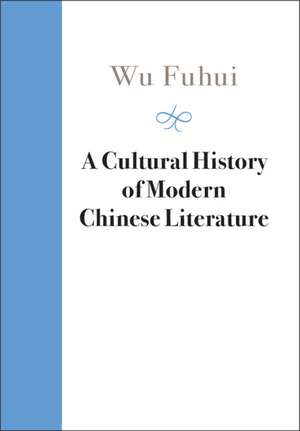A Cultural History of Modern Chinese Literature: The Cambridge China Library
Autor Fuhui Wuen Limba Engleză Hardback – 26 feb 2020
Din seria The Cambridge China Library
- 23%
 Preț: 1806.55 lei
Preț: 1806.55 lei -
 Preț: 552.08 lei
Preț: 552.08 lei -
 Preț: 367.33 lei
Preț: 367.33 lei - 23%
 Preț: 1069.73 lei
Preț: 1069.73 lei - 11%
 Preț: 695.06 lei
Preț: 695.06 lei - 9%
 Preț: 1003.32 lei
Preț: 1003.32 lei - 14%
 Preț: 862.47 lei
Preț: 862.47 lei - 11%
 Preț: 694.23 lei
Preț: 694.23 lei - 11%
 Preț: 695.26 lei
Preț: 695.26 lei -
 Preț: 283.03 lei
Preț: 283.03 lei - 14%
 Preț: 892.53 lei
Preț: 892.53 lei - 14%
 Preț: 950.58 lei
Preț: 950.58 lei - 11%
 Preț: 713.07 lei
Preț: 713.07 lei - 19%
 Preț: 2675.13 lei
Preț: 2675.13 lei - 19%
 Preț: 1030.17 lei
Preț: 1030.17 lei
Preț: 1212.14 lei
Preț vechi: 1409.47 lei
-14% Nou
Puncte Express: 1818
Preț estimativ în valută:
231.96€ • 239.66$ • 192.95£
231.96€ • 239.66$ • 192.95£
Carte disponibilă
Livrare economică 26 februarie-12 martie
Preluare comenzi: 021 569.72.76
Specificații
ISBN-13: 9781107069497
ISBN-10: 1107069491
Pagini: 856
Ilustrații: 680 b/w illus. 10 maps 21 tables
Dimensiuni: 184 x 260 x 43 mm
Greutate: 1.91 kg
Editura: Cambridge University Press
Colecția Cambridge University Press
Seria The Cambridge China Library
Locul publicării:New York, United States
ISBN-10: 1107069491
Pagini: 856
Ilustrații: 680 b/w illus. 10 maps 21 tables
Dimensiuni: 184 x 260 x 43 mm
Greutate: 1.91 kg
Editura: Cambridge University Press
Colecția Cambridge University Press
Seria The Cambridge China Library
Locul publicării:New York, United States
Cuprins
List of illustrations; List of maps; List of tables; Introduction to the English edition David Der-wei Wang; Preface; Part I. Promise of New Opportunities: 1. Wangping Street – Fuzhou Road: change of the scene of Chinese literature; 2. Vernacular newspapers and transformation of the written language of literature; 3. Earliest intellectuals with global outlook; 4. The 'new literary style' movement, a political motion in origin; 5. Chronicle of literary events in the year 1903 (an era of literary accumulation); 6. The rising of urban popular novels in an emerging international trading centre; 7. Emerging elites of the south society; 8. From Suzhou and Yangzhou to Shanghai: literature of the Mandarin Duck and Butterfly Literary School; Part II. The May Fourth Enlightenment Movement: 9. Introduction of spoken drama into China: the earliest theatre performances; 10. Building a bridge to world literature; 11. Incubation of a literary revolution home and abroad; 12. Rise of radicals from the New Youth and Peking University and Conservatives' Counter Claims; 13. Chronicle of literary events in the year 1921 (an era of literary enlightenment); 14. A literary niche created by newspapers, magazines and publishing houses of Beijing and Shanghai; 15. Leading breakthroughs in modern vernacular poetry and short stories; 16. A history of the dissemination and acceptance of 'The True Story of Ah Q'; 17. 'Yu Si', 'casual talks' and vernacular prose style; 18. Discovery of peasants and local colours by earlier native-soil literature; 19. Literary solace for urban citizens; Part III. The Coexistence of Diverse Types of Literature: 20. To the South: the return of literary centre; 21. Popularity, deepening and disputes of the left-wing literature; 22. Novels strongly characteristic of the era; 23. The successive boom of era-specific and individualized literary writings; 24. The graceful beauties of Belles-lettres by Beijing School Authors; 25. The new sensations of Shanghai School in the modern metropolis; 26. The literary horizon of two types of civilian society; 27. The professional theatre spoken drama in its mature stage; 28. Chronicle of literary events in the year 1936 (an era of diversification); 29. Interactions between cinematographic art and literature; 30. Timely and overall embrace of world literature; Part IV. Under the Clouds of War: 31. Forming of multiple literary centres under the clouds of war; 32. Intellectuals' economic conditions and their writing lifestyle; 33. Chongqing: national salvation literature, from boom to split; 34. Yan'an: from the wartime art and literature for the masses to the guiding principle of art and literature for workers, peasants and soldiers; 35. Guilin: the upsurge of theatre and publishing phenomenon of the wartime 'cultural city'; 36. Kunming: reflections on personal experience of the era; 37. Shanghai and others: the pain of homelessness and the roundabout development of urban popular literature; 38. Hong Kong and Taiwan: separation, autonomy and growth of new literature; 39. From peasants to urban citizens: new momentum for the development of popular literature; 40. Chronicle of literary events in the year 1948 (an era of transition); Select bibliography; Index.
Notă biografică
Descriere
The first English translation of Wu Fuhui's cultural history of modern Chinese literature from the late nineteenth century to 1949.
